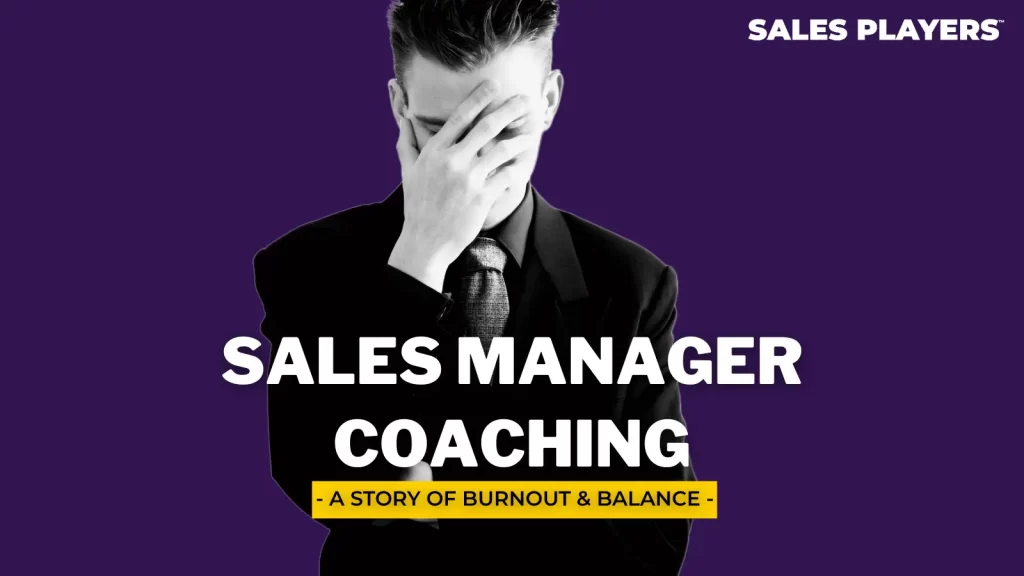This is a story about Greg — one of my sales manager coaching clients.

He was a newly promoted sales leader in a fast-paced tech company, trying to manage a growing team while still carrying his own quota.
Over the course of 12 months, we worked together to help him navigate the pressure, manage his team more effectively, and find some control in the chaos.
What follows isn’t a success story wrapped in a bow. It’s real.
The stress, the self-doubt, the constant juggling — it’s what many sales managers live through but rarely talk about.
Life Before Sales Manager Coaching
Greg sat in traffic, knuckles tight on the steering wheel, phone buzzing in the passenger seat.
It was 5:30 PM, and while most people were thinking about dinner, Greg was trying to figure out how to squeeze in one more call before he got home.
Emails piling up. Slack messages pinging. A US client chasing a response. His wife texting: “Are you nearly home?”
This wasn’t new. It was daily life. And it was exhausting.
Greg had started in sales, like many do — driven, competitive, scrappy.
He could close deals, hit quota, and handle pressure. But now he was managing a team. And nothing had prepared him for what that actually meant.
Managing people? Delegating? Holding underperformers accountable? Balancing his own quota with leadership responsibilities?
That wasn’t in the sales playbook.
And it sure as hell wasn’t in any training he’d received.
Greg was burning out. And he didn’t know how to fix it.
Why Greg Didn’t Ask for Help
Greg wasn’t the type to ask for help. He believed in graft, getting on with it, and handling problems himself.
That’s how he’d always worked — and it had served him well in sales.
But this was different.
Leading a team wasn’t just more work — it was a different kind of work. One that left him feeling exposed.
He thought about speaking up, maybe asking his boss for advice, but stopped short every time. What would he even say? “I’m not coping?” “I don’t know what I’m doing?”
Instead, he buried it. Told himself it would get easier. That he just needed to push through. That’s what people like him did — they cracked on.
But deep down, he knew this wasn’t sustainable. And the cracks were showing.
Greg’s Breaking Point
His breaking point wasn’t dramatic. It wasn’t a meltdown or public failure.
It was quieter than that.
One morning, he recorded a podcast with a senior executive. No time to prepare. No plan. Just him winging it between meetings, thinking, “I’ll figure it out.”
Afterwards, he sat there, drained, thinking: “I knew I shouldn’t have agreed to this. I’m stretched so thin I’m useless at everything.”
And that thought didn’t leave. It followed him into the evening, to dinner, to bedtime.
It was the same feeling he got every time he avoided a difficult conversation with his team, or said yes to yet another task he didn’t have time for.
Later that evening, he sat on the sofa, exhausted, watching his one-year-old daughter crawl across the floor.
I remember him telling me about the wave of guilt that hit him.
She was too young to know how distracted he’d been. Too young to notice that he’d missed dinner again. Too young to understand that, most evenings, her dad was physically present but mentally miles away.
But he knew.
And it was eating him alive.
He was missing it — missing her, his wife, these moments — and for what? Another Slack message? Another late-night email?
That was the moment.
No drama. No meltdown.
Just quiet, painful clarity: Something had to give.
The Unseen Challenges of Sales Leadership
Here’s where most people get it wrong about managing a sales team:
Being a great salesperson doesn’t automatically make you a great sales manager.
Greg thought hitting targets would be enough. But leadership isn’t just about numbers. It’s about people, processes, pressure, and perception.
And no one teaches you how to handle:
- The stress of carrying your own quota and your team’s performance.
- The frustration of managing underperformers when no one backs your decisions.
- The constant pressure to be available — to your team, your boss, your clients.
- The feeling of drowning in meetings, emails, and expectations.
Greg didn’t lack talent. He lacked support, structure, and clarity.
That’s when he decided to get some outside help and look into executive sales coaching.
Small Changes, Big Results
Greg didn’t need a motivational speaker. He needed practical help. So we started small.
- He blocked his calendar for lunch and actually took it.
- He moved 1:1s from bi-weekly to weekly to build team accountability.
- He stopped jumping on every call and started delegating, even if it wasn’t perfect.
- He tracked when self-doubt crept in and recognised his stress triggers.
One of the biggest breakthroughs? Letting go of being the “nice guy” and addressing underperformance head-on. Not aggressively. Just clearly.
He realised that holding people accountable protected the culture — it didn’t destroy it.
What Greg Learned (and Why It Matters)
Greg learned that leadership isn’t about doing more.
It’s about doing less, but doing it better.
It’s about:
- Prioritising time and energy.
- Building habits that reduce stress.
- Creating a team culture where expectations are clear.
- Managing yourself first, so you can lead others properly.
If you’re a sales manager or leader, coaching helps you get clear, stay focused, and perform under pressure.
It helps you become the kind of leader your team needs, without losing yourself in the process.
That’s what Greg experienced. And it changed everything.